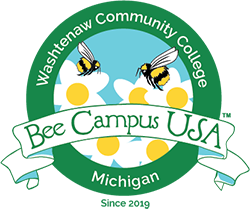Washtenaw Community College has been recognized as a Bee Campus USA affiliate for the third consecutive year for enhancing pollinator habitats and educating the community.
In 2021, WCC created or enhanced 28,800 square feet of pollinator habitats on campus and led nearly 250 people in service-learning projects and educational outreach to highlight the need to restore bee populations.
 WCC was the third Bee Campus USA in Michigan and 88th in the country when it was first recognized in 2019 by the Xerces Society for Invertebrate Conservation.
WCC was the third Bee Campus USA in Michigan and 88th in the country when it was first recognized in 2019 by the Xerces Society for Invertebrate Conservation.
Landscaped beds planted with perennials and thousands of annual flowers adorn the campus grounds and are visited by different types of pollinators. Several bee-friendly rooftop gardens are also cultivated in addition to the student Food Forest maintained by the Students 4 Sustainability and Dr. Emily Thompson, biology faculty and student group advisor.
Last year, WCC renovated the landscape around the Business Education Building, Family Education Building and a transmission tower to attract more bees. The college follows a tiered approach to pesticide use and avoids all such use in sensitive areas and gardens, according to Holly Herman, WCC Bee Campus USA committee co-chair and Landscape & Grounds Manager.
“WCC is fortunate to have a large natural area surrounding the campus, as well as a robust biology/environmental science curriculum. Both work well together to make our Bee Campus initiatives effective and successful,” Dave Wooten, a biology faculty member on WCC’s Bee Campus USA committee, wrote on the Bee Affiliate Spotlight Blog.
Nearly 150 students from Washtenaw Technical Middle College, which is part of the WCC campus, actively participate in service-learning projects to enhance pollinator habitats. Among other activities, they grow a garden at the hoop house and help organize the Seed Library.
More than one-third of the world’s crops are dependent on bee pollination, and bees are the most important pollinators of fruits, vegetables, flowers, and crops like alfalfa and hay that feed livestock, according to the blog.
The bee population has been declining for various reasons, and outreach events raise awareness of the importance of bees to the life cycle, said WCC Bee Campus USA committee co-chair and librarian Sandy McCarthy.
In addition to hands-on service learning with students, the committee last year hosted presentations to educate the community on topics such as the effects of urbanization on wild bees and Michigan-specific pollinators.
Additionally, five credit courses in biology and environmental science include pollinator-related information, as well as nine personal enrichment courses.
In the fall, a guided nature walk through the campus nature trails will highlight pollination efforts, and a new garden will be planted to attract bees to perennial flowers.
It takes a lot of dedicated people with the same goal to achieve Bee Campus USA status, McCarthy said. Among them are WCC’s landscaping and grounds maintenance crews, faculty members, community enrichment instructors and student volunteers.
In addition to McCarthy, Herman, Thompson and Wooten, other WCC Bee Campus USA committee members are Monica Milla, Lisa Babe, and Kimberly Hill-Edwards.
Find out more at WCC’s Bee Campus website.
Tags: Awards, Bee Campus USA, Campus, June 2022, On The Record, Sustainability, wtmc
